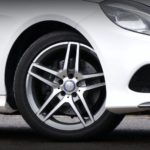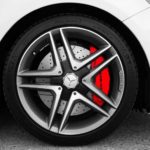Quick Navigation
Being a car owner, you must know all ins and outs of your car.
In some cases, recognizing any unfamiliar car squeaking when reversing or driving can bother you about what might happen next and how much it would cost you.

Understanding the car’s dynamic is pivotal to identifying the cause of the car squeaking when reversing and getting it fixed immediately before it can cause further damage.
Therefore, this article discusses different causes of why a car makes a squeaking sound when reversing it and some of the solutions to this annoying and dreading squeak.
Causes and Solutions of the Car Squeaking When Reversed
Problem With the Breaks
1. Worn Out Pads
When brake pads deteriorate, it causes car squeaks when reversing. Friction causes the brake disc to heat up when the brake pads come into contact with it.
The disc expands as the temperature rises, which causes it to distort and rub against the brake pads. As a result, there is a loud grinding or gurgling sound.
This noise can be very annoying and is frequently accompanied by vibrations, especially in older cars.
Depending on how worn out the pads are, this could happen in both cases, when you reverse the car and also when you switch gears.
In an efficient car, you must have your brakes to be operating as effectively as they possibly can without making any additional sounds.
Therefore, worn brakes might be a cause of concern for you, and you must certainly get it checked.
2. Lack of Proper Maintenance and Excessive Movements
As discussed above, the brake pads cannot only be worn down but might also shift completely in another direction.
This frequently happens when the vehicle isn’t maintained properly or when the brake calipers and pad surface have migrated considerably.
As a result, you hear many noises as the brakes shift. The anti-rattle chips are another component of the brake system.
It is obvious from the name that it is meant to stop rattling. If your brakes lack this or if it has been done without, the noises will persist.
So you must get your anti-rattling chips looked upon if your car is making some noises upon braking.
Solutions
It is advised to take your car to a reputable repair if you believe your brakes are wearing down due to squeaking.
An auto mechanic’s diagnostic session will reveal the nature of the issue, and the appropriate course of action to ensure that your car is in an impeccable state.
To ensure that foreign debris is removed and the braking system operates normally, the mechanic will have the pads and the rotor properly inspected and cleaned.
You can take care of the car’s maintenance needs by:
- Apply disc brake caliper lubricant to the brakes to lubricate them.
- You’ll need to replace the damaged brake component if this doesn’t work. You must ensure that the anti-rattle chips are correctly inserted while being changed. The noise will keep blaring if they are not, whether they have new brakes or not.
Problem With the Engine Belt
As all things seem to deteriorate with time, even your car’s components will start to deteriorate.
Because it is a piece of machinery, this is to be expected and typically not the driver’s fault.
Your car’s engine belts go through much strain and eventually start to wear out and sag.
When you change from being stationary to moving, your worn belts might squeak and squeal because of the difference in motion.
Due to their inability to keep up with the moving pulleys, the belts make a noise as they rapidly stretch.
As belts become more brittle in colder climates, the noises can also become more noticeable.
Solutions
One of the primary solutions to the engine belt issue is to replace the engine belts, which will stop the car from squeaking when reversing.
Any skilled technician can complete the job pretty easily, and it is typically affordable compared to other repairs.
The condition of the engine belt must first be determined before it is replaced. It may be cracked or have missing ribs—possible wear differences between the two sides.
Uneven wear on a belt may cause it to be out of alignment, resulting in a pulley issue. An immediate belt replacement follows this.
Discoloration or wetness may indicate a fluid leak or water on the belt. It doesn’t matter if there is a small water splash on the belt.
If the leak is caused by motor oil, coolant, or another engine fluid, the situation is critical. In this situation, you must immediately bring your car to a professional.
Simply changing the belt won’t make any difference in the long run if the leak isn’t fixed.
Grease Shims
Grease shims could also cause your car to squeak when reversing. To reduce the noise, these require lubrication from time to time.
Thin metal or sticky rubber pads called “grease shims” are used on brakes to fill in small gaps that might occasionally cause noise.
They fit between the brake pad and the brake caliper to fix that rattling noise. Most modern vehicles use these brake shims primarily to lessen noise and rattling.
Since they are unnecessary and function just as well without them, shims are not always included with brake pads but are added upon when the noise becomes noticeable.

Solutions
You must make sure to lubricate both sides of the greasing shims to reduce noise caused by them and prevent any issues with the brake pads.
Additionally, remember that using too much grease might cause a significant buildup of sticky substances, so you must keep a light hand while with grease.
Loose Metal Parts
You could occasionally become very irritated when your car makes noises in reverse. Metal-on-metal contact can also produce this squawking sound.
This noise might be caused by loose metal components that could swing around and run into one another.
Solution
If there is a small metal piece between the car rotor and the pads, it will squeal and need to be checked.
To prevent any metal from getting between the pads and the rotor, clean both. In this way, you can fix the car squealing when reversing.
Sway Bar Problems
A sway bar is utilized to maintain wheel alignment when a vehicle turns or travels off-road. The suspension arms that join the wheel to the body are joined to the sway bar.
The suspension arms will bend as the vehicle travels over rough terrain, keeping the wheel firmly planted.
Damage to the sway bar bushings could cause groans when turning and moving backward.
Solutions
Rubber or polyurethane bushings, called sway bar bushings, are used to lessen vibration.
Sway bar bushings serve as the sway bar’s fulcrum by keeping it fastened to the car’s frame.
Conclusion
When your car squeaks when reversing, it tells you many things you shouldn’t ignore.
It could sometimes mean your transmission or gearbox needs to be repaired or replaced.
Additionally, it could occasionally indicate that the brake pads are deteriorating or something is wedged between the rotors and the brakes.
It would be best if you immediately take suitable action to cater to these squeaking sounds so that it doesn’t damage the car further.

Patrick started his love affair with cars in his childhood. Over the years, he claims a sturdy hold on his driving skills, along with a thorough understanding of cars. We can expect some interesting, holistic, and pleasurable blogs with his flair for writing and his love for cars.
Being a car enthusiast, Patrick has experience comprising of two decades in which he has ridden some of the meanest and strongest machines in the automotive industry. His previous avatars include an automotive professional, photographer, and journalist, and you will certainly experience the roundness of experience in his piece on this site.
In his second decade of reviewing cars and analyzing tools, Patrick is all set to give you convincing, reliable, and the latest information regarding what’s happening in the automotive industry. Currently, he owns a BMW Z3 but cannot get his eyes off Aston Martin DB5. He is a car enthusiast; he loves cooking and listening to music, especially jazz. Here are some of the pieces written by our ace author.







